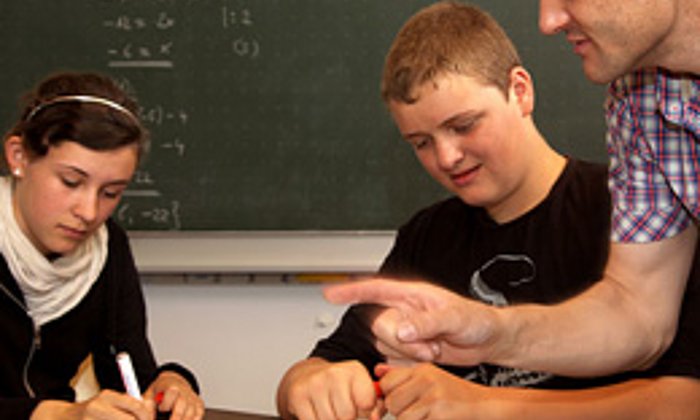Germany significantly above OECD average in all three areas for the first time
PISA 2012: Improved performance in mathematics, science and reading

“The improvement in students’ performance is remarkable,” says Prof. Manfred Prenzel. “Our 15-year-olds today are a whole school year ahead of their peers from back then.”
PISA 2012 is the name given to the fifth round of studies under the Programme for International Student Assessment (PISA), which took place in the summer of 2012. The study is coordinated internationally by the Organization for Economic Cooperation and Development (OECD) and conducted in Germany on behalf of the Standing Conference of the Ministers of Education and Cultural Affairs in the Federal Republic of Germany. PISA 2012 is coordinated by ZIB, the Centre for International Student Assessment, an affiliated institute of Technische Universität München (TUM).
PISA 2012 focused on mathematics, which was last the case in PISA 2003. It also assessed the knowledge and ability of 15-year-old students in reading and science. A total of 5001 students at 230 schools in Germany took part in the tests. The random sampling is representative for Germany.
Mathematics: Significantly fewer very weak students
Students in Germany showed compelling levels of achievement in the mathematics test. They scored 514 points and exceeded the OECD average (494 points) by a considerable 20-point margin. This is another major improvement over PISA 2003. Most importantly, the share of very poorly performing students is down markedly (17.7 percent compared with 23 percent in the OECD states). Germany outperforms the OECD average among the smartest students, too, though there is scope for even greater improvement against outstanding nations here. Within the OECD, Germany now ranks in the top ten in the mathematics test; however, some partner states (Shanghai, Singapore, Hong Kong) in Asia achieved significantly higher scores.
It is particularly noteworthy that the improved performance in Germany does not come at the expense of students’ personal development and well-being. Compared with those in other OECD states, German students exhibit great confidence in their mathematical skills and effectiveness and have a low degree of apprehension in mathematics. The students feel they are socially very well-integrated in their schools. They did, however, express a wish for more support from their teachers in class.
Science: Continued improvements at a high level
Science is where Germany has made the most progress in all of the PISA rounds so far. This was also confirmed in PISA 2012. With 524 points, Germany’s young people outperformed the OECD average (501 points) by a considerable margin. Germany has far fewer students in the low performance range than the average OECD state.
Reading: Germany above OECD average for the first time
Compared with mathematics and science, reading skills was an area where German students were somewhat weaker. Now, in PISA 2012, Germany has moved up to join the ranks of nations that significantly exceed the OECD average. The rise in test scores between PISA 2000 (484 points) and PISA 2012 (508 points) also testifies to the substantial advances made in recent years. Here, too, Germany saw a considerable fall in the proportion of very weak students; however, at 14.5 percent, the figure is still too high.
Differences caused by social background less marked
The results of PISA 2012 demonstrate that the improvement in skills has not come at the expense of students from households with lower socioeconomic backgrounds. In fact, this group has seen their performance grow impressively, significantly reducing the disparities related to background. The correlation between background and skills now reflects the OECD average. There are today a number of countries (such as France and New Zealand) where the correlation is stronger than it is in Germany. Nevertheless, Germany must keep up the good work if it is to achieve the existing constellation in very successful states: namely, a high level of skills with a low correlation to social background.
Furthermore, in PISA 2012, 15-year-olds with a migration background in Germany once again scored less highly on average in mathematics skills than did 15-year-olds without a migration background. The gap has, however, narrowed substantially since PISA 2003. It bears mentioning that students who have migrated to Germany scored on average 485 points, which puts them just 9 points below the OECD average for all 15-year-olds. As a result, young people with a migration background in Germany are performing at the same level as all students, such as those in the USA (481) and Sweden.
Further work needed on school development
Overall, the national project management team is very pleased to be able to report very positive findings for Germany from PISA 2012. The TUM scientists and the other ZIB partners from the German Institute for International Educational Research (DIPF, Frankfurt) and the Leibniz Institute for Science and Mathematics Education (IPN, Kiel) found a great deal of proof that the measures taken since PISA 2000 to enhance the curriculum and schools have been effective. They point, in particular, to the introduction of educational standards and school evaluations. In addition, the positive development in mathematics has been helped by the improved quality of the school exercises and approaches to the curriculum, which are based on recent empirical research.
However, the very pleasing positive development seen at schools in Germany to date will only continue if efforts are intensified in the areas of quality assurance, and curriculum and school development.
The full German PISA 2012 study:
www.pisa.tum.de (text in German)
Contact:
Prof. Manfred Prenzel
Centre for International Student Assessment at TUM
Tel: +49 151 53 92 33 52
pisa@edu.tum.de
Technical University of Munich
Corporate Communications Center
- Klaus Becker
- becker@zv.tum.de
- presse@tum.de
- Teamwebsite



